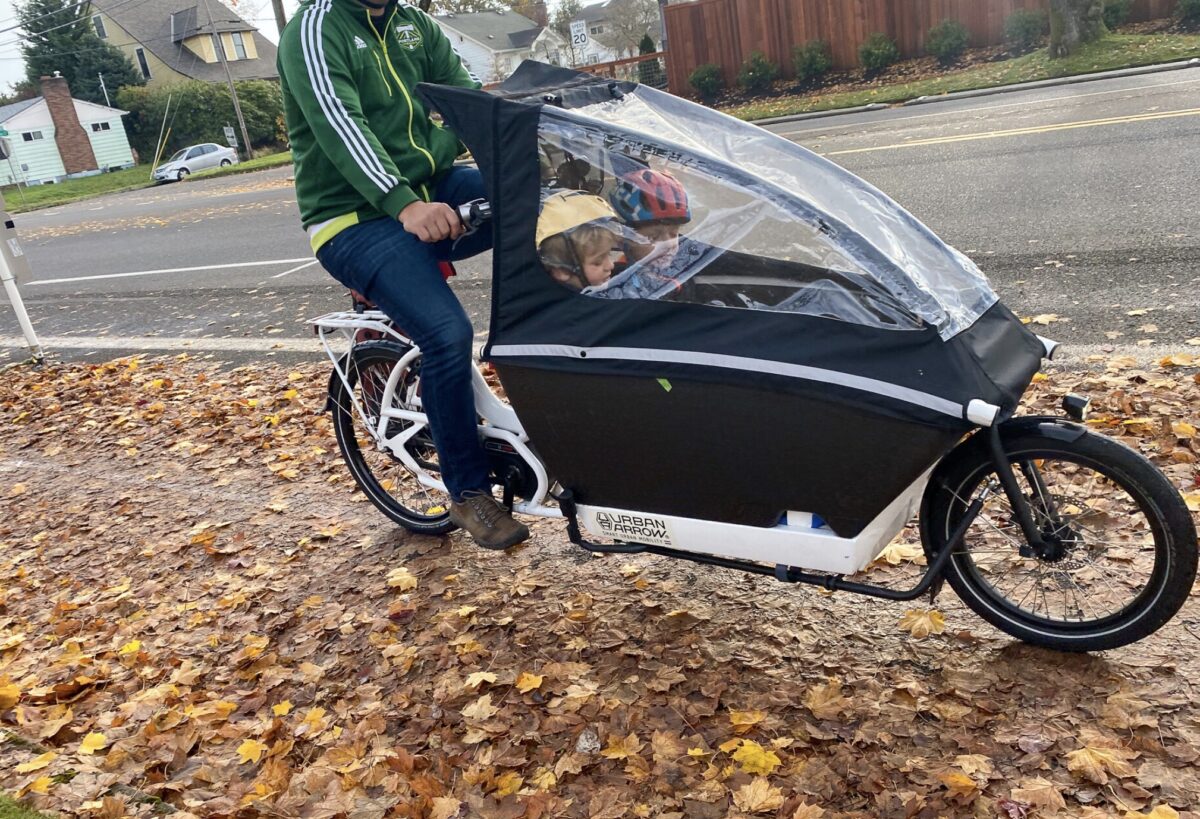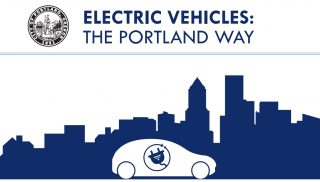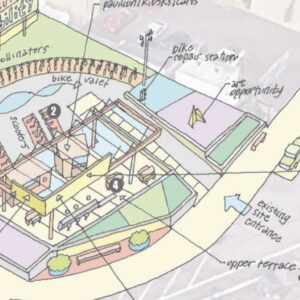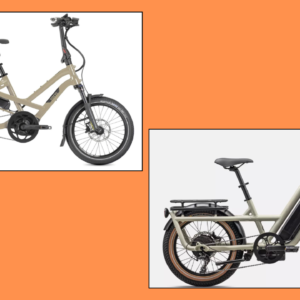
(Photo: Jonathan Maus/BikePortland)
As electric bikes continue to win over fans in Portland and beyond, the need for public charging locations will increase. As we shared in a guest post yesterday, one of the conundrums facing e-bike users is that having a motor on their bike increases the range of destinations, but it can also increase anxiety about not making it home on one charge.

“Range anxiety” was a hot term when it was coined 10 years ago, and until now it referred almost exclusively to electric cars. With e-bikes getting yet another boost in popularity due to the pandemic, it’s time for transportation agencies to put them on equal footing with cars when it comes to electrification initiatives.
On November 17th the Oregon Department of Transportation hosted the first meeting of the Transportation Electrification Infrastructure Needs Analysis (TEINA) Advisory Group. The TEINA was spurred by Oregon Governor Brown’s executive order on “climate action” that called on state agencies to reduce greenhouse gas emissions. It’s being run by the ODOT Climate Office in partnership with the Oregon Department of Energy. The effort will, “Highlight gaps in electrical vehicle charging infrastructure and propose solutions to help accelerate widespread transportation electrification in Oregon.”
Advertisement

We’ve seen these efforts before and have long been concerned that they minimize or completely overlook electric bicycles. In 2010 the City of Portland published a report that laid out a strategy to encourage electric vehicle use. Unfortunately it made no mention of bicycles. Portland’s 2015 Climate Action Plan also failed to make the connection between e-bikes and the need for bike-specific charging stations. Among the action-items the plan aimed to complete by 2020 was to, “support use of electric bikes.” But a separate action in the plan called on the city to “expand and support electric car charging stations in publicly accessible locations.”
The City of Portland and the State of Oregon cannot afford to overlook bikes in these efforts this, and we can’t assume they’ll keep e-bikes in mind. Even bike-minding planners at the newly-opened Gateway Green Bike Park didn’t have the issue on their radar.
At first glance, it looks like ODOT will include bikes in the conversation. “Convenient, accessible charging infrastructure is a critical driver in accelerating the widespread adoption of electric vehicles (EVs) and other types of electric transportation (such as electric buses, delivery vans, freight trucks and e-bikes),” reads the TEINA website (not sure why they put e-bikes in a separate category from EVs, since bicycles are considered vehicles in Oregon law, but I digress). Another passage reads, “Provide a near-term and long-term high-level overview of the charging infrastructure needs for other vehicle classes and use types, ranging from medium and heavy-duty trucks and buses to e-bikes and e-scooters.”
Advertisement

But a closer look at the TEINA advisory group membership and other documents on the website give reasons for concern.
No one on the 17-member advisory group represents bicycles, e-bikes are lumped into the micro-mobility category with e-scooters (no offense to scooters), and the “project overview” says the study will, “Evaluate needs of 9 specific drivers & use cases.”
Asked about the makeup of the advisory group, an ODOT spokesperson said there was no application process and that members were chosen by project leaders. Among those chosen are the leader of driving advocacy group AAA, the public policy manager for General Motors, consultants, and reps from cities, counties, and energy companies.
The engagement plan for the study will include the advisory group and 11 “listening sessions” with various user groups. Those sessions will be focused on transit users, farmers, real estate developers, freight interests, and micro-mobility — where we’d expect e-bikes to be discussed.
We should not be hoping e-bikes get their due in these planning processes. Given that e-bikes can unlock huge benefits to urban, suburban, and rural Oregonians and offer better ROI than perhaps any other form of transportation (besides analog bikes), they should be front-and-center.
If you want to track this initiative, check out the TEINA website. They have three more meetings planned between now and May 2021 when they plan to complete the draft report. For a great resource on all things EV in Oregon, check out GoElectric.Oregon.gov.
— Jonathan Maus: (503) 706-8804, @jonathan_maus on Twitter and jonathan@bikeportland.org
— Get our headlines delivered to your inbox.
— Support this independent community media outlet with a one-time contribution or monthly subscription.







Thanks for reading.
BikePortland has served this community with independent community journalism since 2005. We rely on subscriptions from readers like you to survive. Your financial support is vital in keeping this valuable resource alive and well.
Please subscribe today to strengthen and expand our work.
Well, the list of advisory board members is very disappointing. There are plenty of politically active e-bike advocates around. So, not having one at the table just feels lazy (and/or misguided) on the part of the project leaders.
I would say misguided, because that can encompass a lot of faults. Such as biased against cyclists or believing the chosen stake holders really are the best suited for the role.
I was looking around the other day and found the Swiftmile startup that has made some interesting looking solar-powered public charging stations. Most of their biz. is targeted at bike/scooter share, but the free public concepts look cool.
https://swiftmile.com/
Where I live e-bikes are used exclusively by people able to fork out $1,500-$5,000 without breaking a sweat, plus the extra maintenance costs, typically wealthy white people. I have yet to see an e-bike at even my high-priced local food coop or parked outside of Whole Foods, but then this the pleasantly mediocre city of Greensboro in bucolic NC.
But I am curious, given Portland’s well-earned reputation as America’s bike theft and chop shop capital, how often are personal e-bikes used in day-to-day transportation and errands? Do locals ride them to Fred Meyers, Trader Joe’s or Whole Foods? What is their theft or vandalism rate versus other bikes? Is there any commercial value in these stores offering plug-in facilities?
I see people riding them out in outer-east Portland and Gresham. The folks I see definitely don’t look like wealthy people. Closer in to downtown, you will see more of that.
“Where I live CARS are used exclusively by people able to fork out $1,500-$5,000 without breaking a sweat, plus the extra maintenance costs, typically MOST people.”
Times just need to change a bit, that’s all. Ebikes do make the most sense in cities as a car replacement/supplement. More of them will get to the ‘burbs once people have bike friendly infra there.
I think the average price paid for a used car in Portland is closer to $10,000 to $15,000 – far higher than the cost of an e-bike. Thus, e-bikes can be a bargain for someone who doesn’t need to commute more than 15 miles. 15 miles should be pretty doable on an e-bike, IF the streets and paths can support it.
People whose resources are limited don’t pay even the average. Based on my experience, a person looking for a purely utilitarian vehicle could find one for about $5,000 and expect to do $1000 to $2000 in defered repairs. You can spend less if your knowledge of cars is good and / or the vehicle is thoroughly vetted.
One anecdote: mine is my primary means of transportation, and I ride it to grocery stores all the time. I haven’t had much concern about theft. (I wouldn’t leave it out overnight though.) I normally wouldn’t have a need to charge it at a grocery store, since if I’m going grocery shopping I go close to home, and there’s plenty or range for that. I do charge it when I ride to my parents’ house in the suburbs, but otherwise I generally have enough battery range to get to where I want to go and back.
Just as you’d expect in east PDX. Not good.
Well, bike theft is rampant in Portland. As ebikes increase in numbers they will be targeted and stolen more often as crooks realize their value. I wish we could have universal registration of bikes (via Bike Index and Project 529) If that occurred, bike theft would plummet.
So people REGISTER YOUR BIKES! and encourage your friends (and even your enemies) to do so as well. 🙂
RIDE ON!
LINKS for Registration. It’s free.
http://www.bikeindex.org
http://www.Project529.com
Greensboro has a Whole Foods! That’s incredible. I thought Piggly Wiggly was the only option for gourmet foods there. :). Just kidding. 🙂
Regarding Portland being the bike theft and chop shop capital of the world. You’re right. With the lack of public support for the police department and lack of prosecution by the liberal district attorney it’s not surprising. Due to the recent Draconian police budget cuts the one governmental entity (Portland Police Bike Theft Task Force) that combated bike theft was eliminated. Be glad you’re in Greensboro. It’s anarchy in PDX!
https://bikeportland.org/2020/09/25/police-budget-cuts-cripple-bike-theft-response-unit-320964
For years we haven’t had a Piggly Wiggly, but we are finally getting one again. Windixie is long gone. Publix just moved in, as has Aldi, Lidl, and Trader Joe’s. Our Kroger chain is called Harris Teeter (as opposed to Fred Meyer and Quality Foods in Portland). No Safeway, but they do have them in Virginia and DC. The big chains out on the East Coast are the Belgian “Food Lion” local supermarkets, and upmarket Fresh Market & Lowes Foods. Whole Foods, REI, the Apple Store and Sanoma & Williams are all in the same high-end market on Friendly Street. (It’s called Friendly because it leads to Guilford College, a Quaker college – Quaker churches are known as “friends halls”.) No WINCO nor Grocery Outlet, alas, I do miss them.
For a bike to get stolen here, it has to be left unlocked outside for two weeks minimum. And even then our thieves prefer Next and Magna.
Never thought I would type these words but maybe I should consider a move back to North Carolina! 2 weeks unlocked bicycle and not stolen plus a Trader Joe’s.. Sounds like nirvana!
Bike facilities here suck – our bike commute share is only 0.2% and Greensboro is nationally famous for consistently being among the top 5 most cities of being relatively car-traffic free. And wealthier NC cities like Raleigh, Durham, or Charlotte do have bike theft issues, just not as bad as Portland’s (Charlotte has great bike facilities btw). And the summer heat and humidity takes some getting used to. On the other hand, people here are simply more friendly and nicer than those I encountered when I lived in the Northwest.
David, you would be amazed at the Whole Foods in the Hollywood neighborhood (on Sandy). It’s now completely boarded up with plywood due to vandal/protestor attacks. The amount of businesses boarded up with plywood in Portland is incredible. All of the far left progressives “look the other way” because it’s only property damage and they think vandalism promotes racial equity. Plus, plywood is a local product.
Remember the Portland mantra….”BUY LOCAL! 🙂
Back to the original topic, Ebikes are cool and I want one. If only my taxes weren’t so high I’d get one.
I would be amazed – I lived nearby in Sullivan’s Gulch 2002-6.
In SE, there has been a black mother of two who has a long tail. I have been seeing her toting her two kiddos since probably 2012.
As others have stated, most people still expect bicycles to cost less than $1000. This is getting harder and harder to find. Yes, they still exist, but the volume of bikes above this price point is becoming more and more overwhelming.
Theft if definitely a consideration with broader ebike adoption. They are currently so rare and unique looking, that it’s harder to get away with. But if we’re going to build a modern green transportation system that relies in part on e-assist transport, I think the theft potential vs the cost of a bike needs to be solved. When I go shopping by bike, I take my cheapest bike so I won’t be so sad if it isn’t there when I get back. It’s one of the things stopping me from getting an ebike right now. That and I don’t really go anywhere anymore during lockdown. But that aside, I would worry about a $2-$7k bike locked up out of sight.
It seems like there is a market for concealed easy to use gps trackers, so you can at least track down a stolen bike and recover it quickly, before it’s stripped/painted/destroyed. It looks like there are a number of products like this, though I don’t have any experience with them.
That being said, there are so many things in our society that are venerable or not hardened. But we get along both by having stochastic but real protections and just a level of common social conventions against. I mean locks (even very expensive ones) are relatively trivial to defeat or bypass, yet we still lock our houses, garages, and cars. If you’ve ever seen a skilled road service tech “break into” your car in 5 seconds, you know how easy it is. Cars are really extremely venerable to theft and vandalism well in excess of an ebike. A newer car can be keyed on multiple body panels in seconds and cause huge repair bills. Wheels can be stolen in minutes and be worth a thousand or more. Yet people park their cars and leave them unattended constantly.
Theft is certainly a barrier, as is cost. But I don’t think these are insurmountable challenges and the stakes for the future seem pretty high.
Office Sanders of the now defunded Portland Police Bike Theft Task Force feels that if we could get bike registration levels up to a critical mass in Portland it would virtually eliminate bike theft. Maybe we could be the first city in North America to do that!
REGISTER YOUR BIKES (E-bikes too)!!
http://www.bikeindex.org
http://www.Project529.org
I disagree, they are very common and they don’t look terribly unique. They look like bikes, as much as baloony carbon frames look like bikes.
I park in the front of the store where all the traffic is going in and out. Time and exposure are the biggest deterrent to theft. A thief who has enough time and concealment will steal anything. So get a good lock that will slow them down and park in highly visible spots.
My e-bike is actually more secure than my gravel bike because I use ABUS Nutfix skewers and seat post lock on my e-bike.
As the cost of analogue bikes (a-bikes) goes up, the relative cost of e-bikes goes down. While it is possible to find a new bike under $1000, there are fewer and fewer reputable brands that serve that market segment. The high end of the bike market is into five figures. Of course, you wouldn’t do your grocery shopping on a Pinarello. Still, the price spectrum is stretching upward and outward.
I thought e-bikes had enough battery range for a round trip commute?
Are they unrideable without battery assist? Put another way, should we stop calling them e-bikes and just treat them as electric scooters?
Not at all. Probably about 50% of the power on average for mine comes through the pedals, counting times when the assist is switched off, which is pretty often. It rides just fine with no battery, BUT keep in mind that the people who ride them are on average less athletically able than people who ride normal bikes, so a long trip with no battery may be more daunting to them. Whether they have enough battery for a round trip commute obviously depends on the length of the commute.
I usually see 30+ miles range advertised. How many e bike riders have a 15 mile commute?
I’ve got a 13 mile commute, but I charge at home and at work so I can keep my battery between 20% and 80% as much as possible.
Totally rideable with a dead battery, just slower. Being able to go 20 MPH the whole way means I have time to bike to work more often. Finding the time to bike to work when I had an a-bike was more difficult.
My one way is 11.5 miles, with lots of hills. My battery is more than enough for that. But I couldn’t do round trip on a single charge. I come up about a .25 mile short.
Freewheel loss is something to keep in mind. Lift the wheel up in the air and spin it at 15mph with no load on it. This will draw some power from the battery and this represents the baseline load which can be considerable.
A motor sized to pull you up the steepest hill you might encounter under full load at 15mph with zero pedaling consumes quite a bit of juice even when you’re just using very mild assist. A dual motor setup as used in some EVs would preserve range while having power, but this adds cost + weight.
E-bikes come in different classes with different output, batteries, motor control, etc. The answer to that question depends heavily on a lot of factors. Most e-bikes have a “boost control”, that is, a method to determine how much power the motor adds to the rider. In lower-power modes this can sometimes double the range. If you have 50lbs cargo bike, your range is going to be less than a lighter/smaller bike.
It depends on a lot of factors, most notably, how long the commute is. My commute is 21 miles round trip, with hills. So, it’s not feasible at the highest assist level. I linked the Bosch Range Calculator. Give it a play and see how different factors influence range.
If Portland were flat, you wouldn’t need to rely on the motor. However, the Portland area in general is not flat, there are a lot of gentle grades and steel inclines that make it very difficult for the average person to utilize these effectively, unless you want to get around at 5 mph or so.
Also, the batteries in e-bikes are tiny compared to an electric car or motorcycle. We are talking maybe half a kwhr for a large pack.
500wh (half a kwhr) batteries are standard on most production e-bikes. Bosch is now producing 650wh batteries and other brands have 750wh batteries.
I have two e-bikes, and I don’t see a public charger as something I would ever use outside of work. The battery on one bike will take me about 20 miles; the other about 25 miles. I keep a careful watch on the battery levels and won’t leave the house on any trip that might exceed the battery range – I will top up the battery before heading out.
I think that e-powered transportation requires a different mindset from gas-powered transportation. I see two big differences:
1) Charging the battery takes time, so you want to have something useful to do while charging, which is why charging a battery overnight at home makes the most sense. Or you want to charge while you’re at work. It’s nothing like pulling into Fred Meyer Fuel and leaving five minutes later with a full tank.
2) You can use your car spontaneously and you don’t notice you’re low on fuel til the “low fuel” light comes on. But in an EV you are *very* mindful of the battery level at all times, so you are also more planful about your trips.
Charging stations for e-bikes should reflect the ways people use e-bikes, so it’s really sad that ODOT has failed to include people who know e-bikes on their advisory board. But we all know they are really ODOC (Oregon Dep’t of Cars).
A charging station for the e-bike at every public parking station is an encouragement to the citizen to start using electric bikes. Thanks for the good insight to bring up this concern.
They need some secure e-bike charging stations like those from Parkent Cycles. Link: https://www.parkentcycles.com/
All, sorry to be slow chiming in. Forth is part of the team doing this study, and we are definitely committed to e-bikes and have worked on building codes for outlets in bike rooms, BikeTown electrification and more. Jonathan, I will connect you to our lead staff person offline.If others have suggestions for what infrastructure might be needed, please share them directly with the project team via https://www.oregon.gov/odot/Programs/Pages/TEINA.aspx